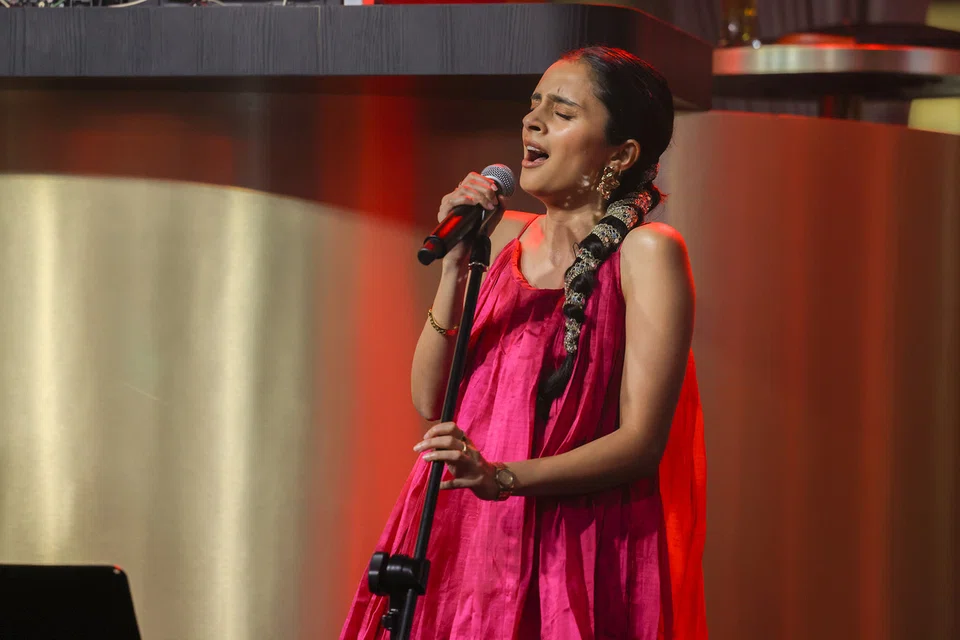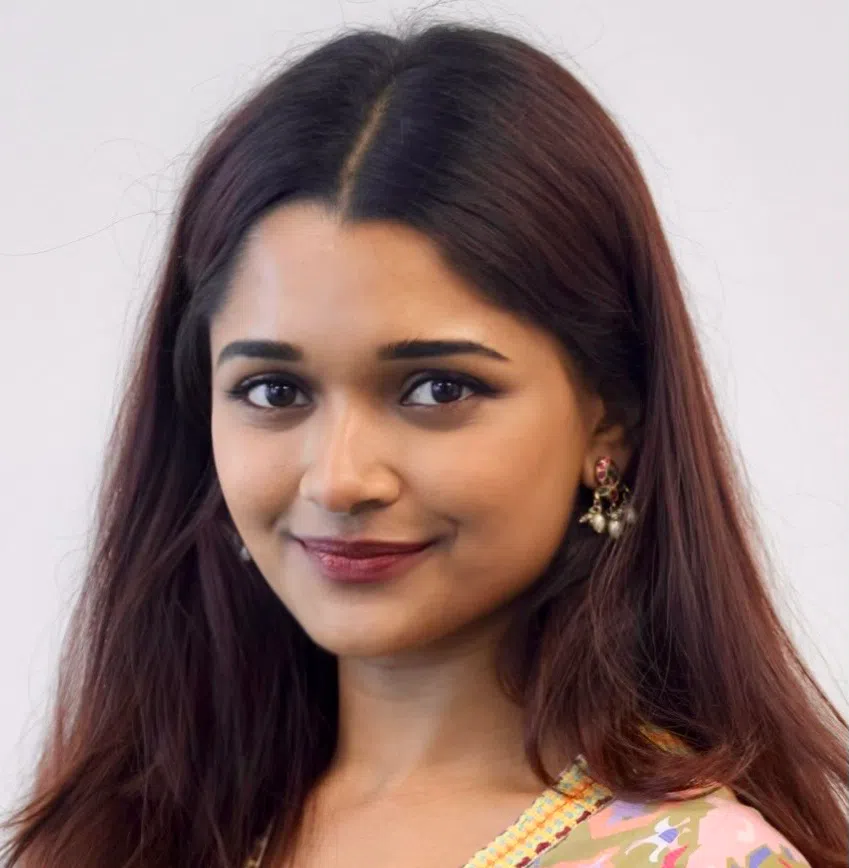Pragathi Guruprasad took the stage on a humid May evening. Her voice was unmistakable, honeyed and precise, and reminiscent of movies that the younger generation in the room had grown up with.
After years of contributing vocals to South Indian cinema, Pragathi has begun to carve out a space as a songwriter and producer in her own right. Her latest work, including the single Adada, signals a new chapter in her career.
Born at Mount Elizabeth Hospital in 1997, the 27-year-old musician traces her artistic lineage to this very island. Her family lived in Bukit Batok for nearly a decade before emigrating to California when she was just two.
Long before any stage lights or studio booths, her musical journey quietly began when her father, Guruprasad, a software engineer by profession and Carnatic music enthusiast by calling, taught local children in their home, not for profit, but out of devotion.
“That is where it all started actually,” she reflected. “My love for singing was born here.” Young Pragathi would linger in the corner of those informal classes, absorbing the raga structures, rhythmic cycles, and devotional textures that would later form the scaffolding of her craft.
Her formal training would come to include both Carnatic and Hindustani classical music, two disciplines that demand vocal agility.
That dual education, rigorous and often ascetic, proved foundational later on in her career, as it instilled in her a discipline she now considers central to her approach as a songwriter, performer, and producer. “It’s the blueprint,” she said.
And yet, like many careers that begin early and in the public eye, her ascent was not entirely intentional.
In 2011, at just 14, she entered Super Singer Junior, a Tamil television competition, at the urging of her mother, Kanaka. “She wanted to see if other people thought I could sing as well as she thought I could. It (Super Singer) went on to completely change my life,” Pragathi said.
What followed was a meteoric rise. Pragathi emerged as a finalist and ultimately the first runner-up, winning the admiration of millions. Almost overnight, she became a fixture in the Tamil playback scene. “It became difficult for me to get out of my house without being swarmed, it was a huge shock for a kid. But my parents kept me grounded.”
Her voice, mature beyond her years, soon found its way into the studio. Among her early recordings, one in particular stands out: Osaka Osaka, composed by Anirudh Ravichander for Vanakkam Chennai. “Anirudh is actually a close friend of my brother’s,” she said, laughing.
“Recording that track didn’t feel like work at all – it felt like a bunch of kids playing around in the studio.” She said the track’s breezy joy and vocal ease reflect the spontaneity of that experience and it remains one of her most beloved contributions to South Indian cinema.
Other tracks followed, including the aching Paravai Parandhuchu from Kadhalum Kadandhu Pogum, and the haunting lullaby Laali Laali from Theeran Adhigaram Ondru.
Still, while music was always the dream, her path wasn’t singular. In the years following her rise on Super Singer, she enrolled at UCLA to study law, a decision shaped by both pragmatism and her father’s stubbornness. “My dad was really adamant that I have a degree to fall back on,” she said. “He believed in my music, but he also knew how unpredictable the industry could be.” She ultimately completed her undergraduate degree programme but chose not to become a lawyer.
However, even as her discography expanded and accolades accumulated, Pragathi found herself approaching a creative precipice. “I was lost,” she admitted. “I wasn’t happy with the work I was doing, and I didn’t know who I was as an artist anymore. I was putting so much pressure on myself. I kept thinking, If I can’t compose like A.R. Rahman, then what’s the point? I had this self-imposed stress.”
It was during this time that a longtime friend and producer, Shravan Sridhar, intervened. “He basically told me to snap out of it. To stop sitting in my own fog and start creating again,” she recalled. What began as a small collaboration turned into something transformative.
The result of that renewed clarity was Adada, a single released earlier this year that reimagines the language of love from a female perspective. For the first time, Pragathi wasn’t just performing music, she was writing and owning it.
And she isn’t slowing down. In an exclusive update to Tabla!, Pragathi revealed she’s currently working on her debut album, with her next single slated for release in the coming months. As for dream collaborations? One name stands out: Dhibu Ninan Thomas. “He is definitely at the top of my list, one of my favourites.”
For Pragathi, her story has just started. In a world that often demands speed and spectacle, Pragathi’s path is a reminder that the most meaningful art still takes time. And perhaps more importantly, that it often begins, quietly, with a child listening to her father sing.


